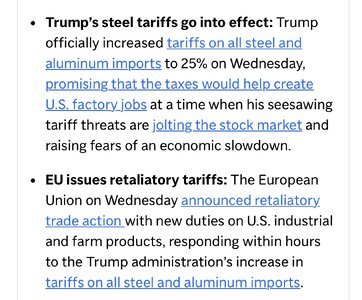- Messages
- 5,217

EU wields ‘sledgehammer’ against Trump tariffs
Brussels strikes back against the U.S. president’s 25 percent levies on steel and aluminum.
The European Union hit back hard as U.S. President Donald Trump imposed 25 percent global steel and aluminum tariffs on Wednesday, announcing a two-stage retaliation covering €26 billion in EU exports that far exceeded a trade fight that blew up in his first term.
The European Commission said it would, from April 1, reimpose tariffs in response to €8 billion in U.S. tariffs — including on iconic American products such as Harley-Davidson motorcycles, bourbon and jeans. And, from mid-April, it will set further countermeasures over €18 billion in new U.S. tariffs, subject to the approval of EU member states.
“We deeply regret this measure,” European Commission President Ursula von der Leyen said in an early-morning statement.
“Tariffs are taxes. They are bad for business, and even worse for consumers. These tariffs are disrupting supply chains. They bring uncertainty for the economy. Jobs are at stake. Prices will go up. In Europe and in the United States. The European Union must act to protect consumers and business.”
Speaking before the announcement, one European steel industry representative said that Brussels would “go full sledgehammer because they are so fed up with Trump.”
The 27-nation bloc — a common market spanning 450 million people — wants to send an unmistakable message that the EU is serious about defending its economic interests should Trump launch a full-scale trade war.
The $1.7 trillion transatlantic trade relationship has been pivotal to the West’s postwar prosperity. But Trump, angered by the persistent U.S. trade deficit in goods, sees tariffs as a way to force businesses to bring industrial investment and jobs back to the United States.




